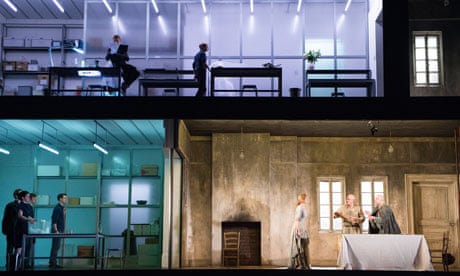Even the greatest opera composers tend to have a few early attempts that get swept under the carpet. George Benjamin, however, seems to have come to opera with his genius fully formed. Written on Skin is not his first music-theatre work – that was Into the Little Hill, a chamber piece from 2006 – but it is his debut full-scale opera, the fruit of an ambition stretching back more than 20 years, and as such it is nothing short of a triumph. As soon as it had finished, I wanted to hear it again.
Premiered in Aix-en-Provence last summer, it retells a 13th-century southern French ballad. The Protector, a ruthless landowner, commissions the Boy to make a book recording his glory. But the skin of the title is not only the book's parchment: it's also that of the Protector's wife, whose sensuality and defiance are simultaneously awakened by the Boy. She ends up being unwittingly served his heart as her final meal.
The opera is now due to be taken up in so many other theatres that a life beyond Katie Mitchell's premiere production, designed by Vicki Mortimer, seems certain. Seen here and in Aix, Mitchell's staging puts an additional gloss on the work in that the narrating Angels – excellently sung by Allan Clayton and Victoria Simmonds – are part of a team of archaeologists. Half of the stage is their world – two harshly lit modern rooms in which they catalogue the finds that, presumably, let them piece together the story being told in the medieval rooms next door.
Their physical prominence, and the way in which they act almost as stage managers manipulating the three main characters between scenes, makes this seem like it might be an opera about archaeology. Which it isn't – though it is at least partly about the ownership of stories, and the two are not unconnected. And it is bookended by images of "the Saturday car park" yielding up ancient lives buried beneath – an image that is now, thanks to Richard III, more vivid than Martin Crimp could have imagined when he wrote it.
Crimp's text has the main characters talking about themselves in the third person, narrating their own actions; though highly artificial, it's surprisingly easy to accept, and it means we get to hear their thoughts almost before they think them. You might think that this conceit would limit Benjamin's scope, given that it is his music's job to get us inside the character's heads. But it is the music that makes the piece. The score, which Benjamin conducts himself, calls for a large orchestra, yet we get only fleeting glimpses of its full power. Instead Benjamin weaves narrow lines around his singers, cradling each word, revelling in evocative sonorities. The weirdest and most wonderful comes in the seduction scene: a bass viol and a glass harmonica intertwine in a gently rasping glow, sparse yet achingly sensual, and the air crackles with tension.
Would the opera work so well without a Protector as adept at portraying cruel, complex characters as baritone Christopher Purves, or a soprano combining fierce presence with such pure tone as Barbara Hannigan, or a countertenor Boy sounding as beguiling and other-worldly as Bejun Mehta? Perhaps not quite. But it would still be a musical masterpiece.




Comments (…)
Sign in or create your Guardian account to join the discussion